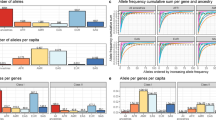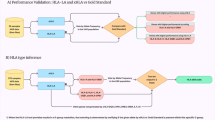Abstract
Patients carrying specific HLA risk alleles are at higher risk for developing drug hypersensitivity reactions, yet pre-therapeutic screening is uncommon. We examined whether patients with a history of drug allergies have more HLA risk alleles to assess whether these patients are potential candidates for pre-therapeutic HLA screening. We performed a case-control study with patients who had a self-reported history of drug allergy (N = 94) and patients without such a history (N = 185). HLA regions were sequenced by use of Alloseq Tx for HLA-A -B, -C, -DP, -DQ and -DR genotypes. A logistic regression was performed to investigate whether the number of HLA risk alleles differed between cases and controls. Sequencing data of 279 patients were available for this analysis. There was no statistically significant difference in the mean number of unique HLA risk alleles between the cases and controls (5.31 vs 5.31, p = 0.9397). Therefore, patients with a self-reported history of drug allergy do not form a suitable group for pre-therapeutic screening for HLA risk alleles to prevent future drug allergies.
This is a preview of subscription content, access via your institution
Access options
Subscribe to this journal
Receive 6 print issues and online access
$259.00 per year
only $43.17 per issue
Buy this article
- Purchase on SpringerLink
- Instant access to the full article PDF.
USD 39.95
Prices may be subject to local taxes which are calculated during checkout
Similar content being viewed by others
Data availability
The datasets generated during the current study are available from the corresponding author on reasonable request.
References
Bouvy JC, De Bruin ML, Koopmanschap MA. Epidemiology of adverse drug reactions in Europe: a review of recent observational studies. Drug Saf. 2015;38:437–53.
Swen JJ, van der Wouden CH, Manson LE, Abdullah-Koolmees H, Blagec K, Blagus T, et al. A 12-gene pharmacogenetic panel to prevent adverse drug reactions: an open-label, multicentre, controlled, cluster-randomised crossover implementation study. Lancet. 2023;401:347–56.
Swen JJ, Nijenhuis M, de Boer A, Grandia L, Maitland-van der Zee AH, Mulder H, et al. Pharmacogenetics: from bench to byte–an update of guidelines. Clin Pharmacol Ther. 2011;89:662–73.
Relling MV, Klein TE. CPIC: clinical pharmacogenetics implementation consortium of the pharmacogenomics research network. Clin Pharmacol Ther. 2011;89:464–7.
Bank PCD, Caudle KE, Swen JJ, Gammal RS, Whirl-Carrillo M, Klein TE, et al. Comparison of the guidelines of the clinical pharmacogenetics implementation consortium and the dutch pharmacogenetics working group. Clin Pharmacol Ther. 2018;103:599–618.
Koninklijke Nederlandse Maatschappij ter bevordering der Pharmacie. CARBAMAZEPINE HLA -B*1502--A*3101--B*1511 2016 [updated 2016, October 31; cited 2021. Available from: https://kennisbank.knmp.nl/article/farmacogenetica/6237-6238-6239.html.
Koninklijke Nederlandse Maatschappij ter bevordering der Pharmacie. FLUCLOXACILLINE HLA -B*5701 2017 [updated 2017, November 20; cited 2021. Available from: https://kennisbank.knmp.nl/article/farmacogenetica/4652.html.
Koninklijke Nederlandse Maatschappij ter bevordering der Pharmacie. LAMOTRIGINE HLA -B*1502 2018 [updated 2018, May 14; cited 2021. Available from: https://kennisbank.knmp.nl/article/farmacogenetica/6932.html.
Koninklijke Nederlandse Maatschappij ter bevordering der Pharmacie. OXCARBAZEPINE HLA -B*1502 2018 [updated 2018, May 14; cited 2021. Available from: https://kennisbank.knmp.nl/article/farmacogenetica/6931.html.
Koninklijke Nederlandse Maatschappij ter bevordering der Pharmacie. FENYTOINE HLA -B*1502 2018 [updated 2018, May 14; cited 2021. Available from: https://kennisbank.knmp.nl/article/farmacogenetica/6927.html.
Koninklijke Nederlandse Maatschappij ter bevordering der Pharmacie. ABACAVIR HLA -B*5701 2019 [cited 2021. Available from: https://kennisbank.knmp.nl/article/farmacogenetica/2356.html.
Pharmacie KNMtbd. ALLOPURINOL HLA -B*5801 2017 [Available from: https://kennisbank.knmp.nl/article/farmacogenetica/6391.html.
van der Pol KH, Nijenhuis M, Soree B, de Boer-Veger NJ, Buunk AM, Guchelaar HJ, et al. Dutch pharmacogenetics working group guideline for the gene-drug interaction of ABCG2, HLA-B and allopurinol, and MTHFR, folic acid and methotrexate. Eur J Hum Genet. 2022;32:155–62.
Manson LEN, Nijenhuis M, Soree B, de Boer-Veger NJ, Buunk AM, Houwink EJF, et al. Dutch pharmacogenetics working group (DPWG) guideline for the gene-drug interaction of CYP2C9, HLA-A and HLA-B with anti-epileptic drugs. Eur J Hum Genet. 2024;32:903–11.
Ghattaoraya GS, Dundar Y, Gonzalez-Galarza FF, Maia MH, Santos EJ, da Silva AL, et al. A web resource for mining HLA associations with adverse drug reactions: HLA-ADR. Database. 2016;2016:baw069.
Claassens DMF, Vos GJA, Bergmeijer TO, Hermanides RS, van ‘t Hof AWJ, van der Harst P, et al. A genotype-guided strategy for oral P2Y(12) inhibitors in primary PCI. N Engl J Med. 2019;381:1621–31.
Coenen MJ, de, Jong DJ, van Marrewijk CJ, Derijks LJ, Vermeulen SH, et al. Identification of patients with variants in TPMT and dose reduction reduces hematologic events during thiopurine treatment of inflammatory bowel disease. Gastroenterology. 2015;149:907–17.e7.
Gimbel M, Qaderdan K, Willemsen L, Hermanides R, Bergmeijer T, de Vrey E, et al. Clopidogrel versus ticagrelor or prasugrel in patients aged 70 years or older with non-ST-elevation acute coronary syndrome (POPular AGE): the randomised, open-label, non-inferiority trial. Lancet. 2020;395:1374–81.
Henricks LM, Lunenburg C, de Man FM, Meulendijks D, Frederix GWJ, Kienhuis E, et al. DPYD genotype-guided dose individualisation of fluoropyrimidine therapy in patients with cancer: a prospective safety analysis. Lancet Oncol. 2018;19:1459–67.
Mallal S, Phillips E, Carosi G, Molina JM, Workman C, Tomazic J, et al. HLA-B*5701 screening for hypersensitivity to abacavir. N Engl J Med. 2008;358:568–79.
Paulsen NH, Pfeiffer P, Ewertz M, Fruekilde PBN, Feddersen S, Holm HS, et al. Implementation and clinical benefit of DPYD genotyping in a Danish cancer population. ESMO Open. 2023;8:100782.
Weitzel KW, Smith DM, Elsey AR, Duong BQ, Burkley B, Clare-Salzler M, et al. Implementation of standardized clinical processes for TPMT testing in a diverse multidisciplinary population: challenges and lessons learned. Clin Transl Sci. 2018;11:175–81.
McDermott JH, Sharma V, Keen J, Newman WG, Pirmohamed M. The implementation of pharmacogenetics in the United Kingdom. Handb Exp Pharmacol. 2023;280:3–32.
Eadon MT, Rosenman MB, Zhang P, Fulton CR, Callaghan JT, Holmes AM, et al. The INGENIOUS trial: impact of pharmacogenetic testing on adverse events in a pragmatic clinical trial. Pharmacogenomics J. 2023;23:169–77.
Elliott LS, Henderson JC, Neradilek MB, Moyer NA, Ashcraft KC, Thirumaran RK. Clinical impact of pharmacogenetic profiling with a clinical decision support tool in polypharmacy home health patients: a prospective pilot randomized controlled trial. PLoS One. 2017;12:e0170905.
Oslin DW, Lynch KG, Shih MC, Ingram EP, Wray LO, Chapman SR, et al. Effect of pharmacogenomic testing for drug-gene interactions on medication selection and remission of symptoms in major depressive disorder: The PRIME care randomized clinical trial. JAMA. 2022;328:151–61.
Manson LEN, Swen JJ, Guchelaar HJ. Diagnostic test criteria for HLA genotyping to prevent drug hypersensitivity reactions: a systematic review of actionable HLA recommendations in CPIC and DPWG guidelines. Front Pharmacol. 2020;11:567048.
UKPGx Network. Pharmacogenomics of serious adverse drug reactions. 2018. https://www.youtube.com/watch?v=TpZ3I7E88Eg.
Manson LEN, van den Hout WB, Guchelaar HJ. Genotyping for HLA risk alleles to prevent drug hypersensitivity reactions: impact analysis. Pharmaceuticals. 2021;15:4.
Chen CB, Hsiao YH, Wu T, Hsih MS, Tassaneeyakul W, Jorns TP, et al. Risk and association of HLA with oxcarbazepine-induced cutaneous adverse reactions in Asians. Neurology. 2017;88:78–86.
Cheng L, Xiong Y, Qin CZ, Zhang W, Chen XP, Li J, et al. HLA-B*58:01 is strongly associated with allopurinol-induced severe cutaneous adverse reactions in Han Chinese patients: a multicentre retrospective case-control clinical study. Br J Dermatol. 2015;173:555–8.
Daly AK, Donaldson PT, Bhatnagar P, Shen Y, Pe’er I, Floratos A, et al. HLA-B*5701 genotype is a major determinant of drug-induced liver injury due to flucloxacillin. Nat Genet. 2009;41:816–9.
Genin E, Chen DP, Hung SI, Sekula P, Schumacher M, Chang PY, et al. HLA-A*31:01 and different types of carbamazepine-induced severe cutaneous adverse reactions: an international study and meta-analysis. Pharmacogenomics J. 2014;14:281–8.
Goncalo M, Coutinho I, Teixeira V, Gameiro AR, Brites MM, Nunes R, et al. HLA-B*58:01 is a risk factor for allopurinol-induced DRESS and Stevens-Johnson syndrome/toxic epidermal necrolysis in a Portuguese population. Br J Dermatol. 2013;169:660–5.
Hetherington S, Hughes AR, Mosteller M, Shortino D, Baker KL, Spreen W, et al. Genetic variations in HLA-B region and hypersensitivity reactions to abacavir. Lancet. 2002;359:1121–2.
Hung SI, Chung WH, Liou LB, Chu CC, Lin M, Huang HP, et al. HLA-B*5801 allele as a genetic marker for severe cutaneous adverse reactions caused by allopurinol. Proc Natl Acad Sci USA. 2005;102:4134–9.
Littera R, Carcassi C, Masala A, Piano P, Serra P, Ortu F, et al. HLA-dependent hypersensitivity to nevirapine in Sardinian HIV patients. AIDS. 2006;20:1621–6.
Saag M, Balu R, Phillips E, Brachman P, Martorell C, Burman W, et al. High sensitivity of human leukocyte antigen-b*5701 as a marker for immunologically confirmed abacavir hypersensitivity in white and black patients. Clin Infect Dis. 2008;46:1111–8.
Chang SL, Lai CH, Lin GC, Chen YM, Lee MH, Hsu HS, et al. Genetic susceptibility of HLA alleles to non-steroidal anti-inflammatory drug hypersensitivity in the Taiwanese population. Biomedicines. 2023;11:3273.
Karnes JH, Rettie AE, Somogyi AA, Huddart R, Fohner AE, Formea CM, et al. Clinical pharmacogenetics implementation consortium (CPIC) guideline for CYP2C9 and HLA-B genotypes and phenytoin dosing: 2020 update. Clin Pharmacol Ther. 2021;109:302–9.
Phillips EJ, Sukasem C, Whirl-Carrillo M, Muller DJ, Dunnenberger HM, Chantratita W, et al. Clinical pharmacogenetics implementation consortium guideline for HLA genotype and use of carbamazepine and oxcarbazepine: 2017 update. Clin Pharmacol Ther. 2018;103:574–81.
Mockenhaupt M, Wang CW, Hung SI, Sekula P, Schmidt AH, Pan RY, et al. HLA-B*57:01 confers genetic susceptibility to carbamazepine-induced SJS/TEN in Europeans. Allergy. 2019;74:2227–30.
Allele frequency net database (AFND) 2020 update: gold-standard data classification oagdanqtG-GF, McCabe A, Santos EJ, Jones J, Takeshita LY, Ortega-Rivera ND, Del Cid-Pavon GM, et al. Nucleic Acid Res. 2020;48:D783–8. http://www.allelefrequencies.net/.
Tiamkao S, Jitpimolmard J, Sawanyawisuth K, Jitpimolmard S. Cost minimization of HLA-B*1502 screening before prescribing carbamazepine in Thailand. Int J Clin Pharm. 2013;35:608–12.
Zhou Y, Krebs K, Milani L, Lauschke VM. Global frequencies of clinically important HLA alleles and their implications for the cost-effectiveness of preemptive pharmacogenetic testing. Clin Pharmacol Ther. 2021;109:160–74.
Koninklijke Nederlandse Maatschappij ter bevordering der Pharmacie. CARBAMAZEPINE HLA -B*1502--A*3101--B*1511 2016 [updated 2016, October 31; cited 2020. Available from: https://kennisbank.knmp.nl/article/farmacogenetica/6237-6238-6239.html.
Koninklijke Nederlandse Maatschappij ter bevordering der Pharmacie. LAMOTRIGINE HLA -B*1502 2018 [updated 2018, May 14; cited 2020. Available from: https://kennisbank.knmp.nl/article/farmacogenetica/6932.html.
Koninklijke Nederlandse Maatschappij ter bevordering der Pharmacie. OXCARBAZEPINE HLA -B*1502 2018 [updated 2018, May 14; cited 2020. Available from: https://kennisbank.knmp.nl/article/farmacogenetica/6931.html.
Koninklijke Nederlandse Maatschappij ter bevordering der Pharmacie. FENYTOINE HLA -B*1502 2018 [updated 2018, May 14; cited 2020. Available from: https://kennisbank.knmp.nl/article/farmacogenetica/6927.html.
Author information
Authors and Affiliations
Contributions
LENM, JJS, and HJG designed the study. LENM wrote the manuscript and performed the data analysis. JDHA and JJMD performed the genotyping. DLR, JJS and HJG critically revised the manuscript.
Corresponding author
Ethics declarations
Competing interests
The authors declare no competing interests.
Ethics approval and consent to participate
The trial was done in accordance with the principles of the Declaration of Helsinki. The Medical Ethics Committee Leiden The Hague Delft (METC LDD) has given a declaration of no objection for the conduction of this study. All patients have provided written informed consent before taking part in this study. This study was registered in the Dutch Trial Register (NTR) under ID NL-OMON21376.
Additional information
Publisher’s note Springer Nature remains neutral with regard to jurisdictional claims in published maps and institutional affiliations.
Rights and permissions
Springer Nature or its licensor (e.g. a society or other partner) holds exclusive rights to this article under a publishing agreement with the author(s) or other rightsholder(s); author self-archiving of the accepted manuscript version of this article is solely governed by the terms of such publishing agreement and applicable law.
About this article
Cite this article
Manson, L.E.N., Anholts, J.D.H., Drabbels, J.J.M. et al. The association between the number of HLA risk alleles and drug allergy and its implications for HLA screening – a case-control study. Pharmacogenomics J 25, 1 (2025). https://doi.org/10.1038/s41397-025-00362-5
Received:
Revised:
Accepted:
Published:
Version of record:
DOI: https://doi.org/10.1038/s41397-025-00362-5



